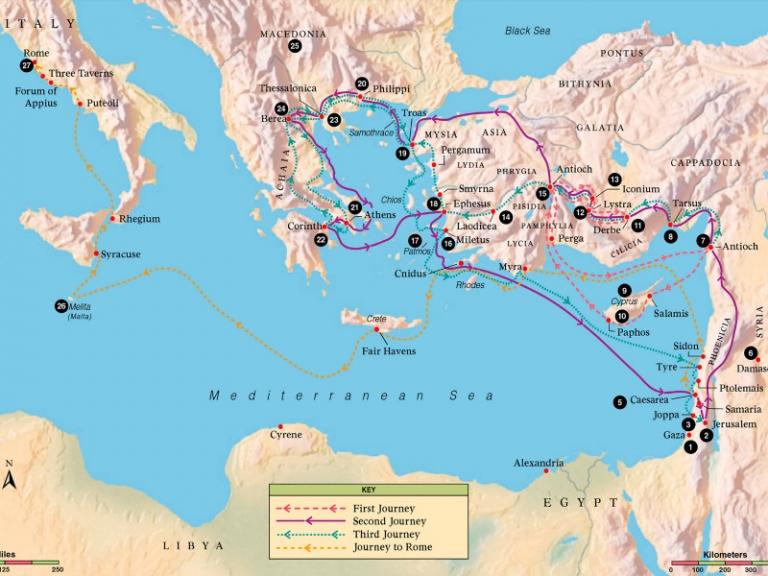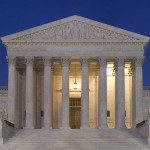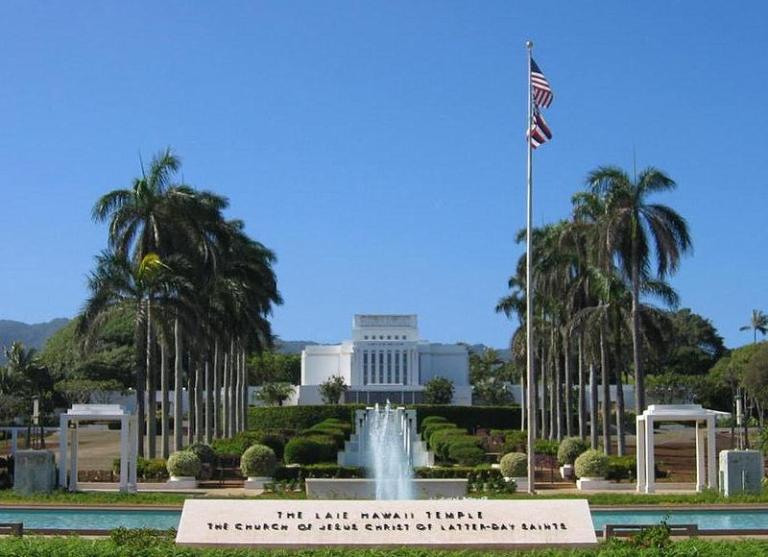
In what has become, without any really conscious intent, my weekly Saturday commentary on a chapter of Acts — I may, in a short while and for nefarious purposes of my own, take a detour to look carefully at part of a chapter in 1 Corinthians and then at part of a chapter in Romans — I come today to Acts 6. This is a very brief chapter, and my comments here will largely deviate from my focus heretofore, which has been on the remarkable and early witness of the apostles to the resurrection of Christ. I find it difficult if not impossible to explain that very early witness absent a firm conviction, on their part, of Christ’s triumph over death. Acts 6 raises a quite different and much more mundane point, social division. As always in these little commentaries, I quote from the English Standard Version (ESV), unless otherwise indicated:
6 Now in these days when the disciples were increasing in number, a complaint by the Hellenists arose against the Hebrews because their widows were being neglected in the daily distribution.
- In this context, the “Hellenists” (Ἑλληνιστῶν) are presumably Greek-speaking Jews, which means that they originated outside of Palestine. The “Hebrews” (Ἑβραίους) are also Jews, of course. But they are Palestinian Jews, whose first language is Hebrew or, more properly at this period, Aramaic.
- The “Hellenists” feel that, because of language and cultural differences, their widows — that is, their needy — are being neglected by the predominantly “Hebrew” membership (and entirely “Hebrew” apostolic leadership) of the Church.
2 And the twelve summoned the full number of the disciples and said, “It is not right that we should give up preaching the word of God to serve tables. 3 Therefore, brothers, pick out from among you seven men of good repute, full of the Spirit and of wisdom, whom we will appoint to this duty. 4 But we will devote ourselves to prayer and to the ministry of the word.”
- It is impossible not to detect a certain exasperation on the part of the Twelve that they are being distracted from the preaching of the Gospel — that is, of the Resurrection — by such temporal matters as the distribution of foodstuffs. (The phrase to serve tables accurately and literally represents the Greek διακονεῖν τραπέζαις.)
- The word ἀδελφοί in 6:3, which the ESV translates as brothers, could also be read as brothers and sisters, since, in ancient Greek, masculine terms were typically regarded as including the feminine, although feminine nouns and pronouns referred specifically to feminine persons. (Sorry, ladies. It’s not my sexism!) If it’s read this way, then women were also involved in the matter. Not inappropriately if, as Acts 6:1 says, the dispute principally involved the treatment of widows (αἱ χῆραι).
5 And what they said pleased the whole gathering, and they chose Stephen, a man full of faith and of the Holy Spirit, and Philip, and Prochorus, and Nicanor, and Timon, and Parmenas, and Nicolaus, a proselyte of Antioch. 6 These they set before the apostles, and they prayed and laid their hands on them.
- It is significant to note that every single one of these names — Stephen, Philip, Prochorus, Nicanor, Timon, Parmenas, and Nicolaus — is plainly Greek. In other words, in order to avoid discrimination against Greek-speaking Jewish converts, the Church membership proposes a committee entirely composed of Greek-speaking Jewish converts, and the apostles ratify the proposal.
7 And the word of God continued to increase, and the number of the disciples multiplied greatly in Jerusalem, and a great many of the priests became obedient to the faith.
- “Priests” (ἱερεῖς) — Jews of Levitical/Aaronic descent (presumably residents of the city, if they are associated with the liturgy of the temple [ἱερόν) — are also joining the Church, not merely Greek-speaking Jews.
The rapid growth of the Church in Jerusalem (difficult to explain if, after his very public and very shameful execution, Jesus’ body were widely known to be still present in his tomb there) soon begins to attract powerful displeasure. The events narrated in the rest of this chapter and in Acts 7 are typically thought to have occurred somewhere between AD 34 and AD 36, which puts it within three or four years of the death of Jesus, however that is dated:
8 And Stephen, full of grace and power, was doing great wonders and signs among the people. 9 Then some of those who belonged to the synagogue of the Freedmen (as it was called), and of the Cyrenians, and of the Alexandrians, and of those from Cilicia and Asia, rose up and disputed with Stephen.
- These verses reflect the same “ethnic” (or cultural or linguistic) divisions among the Jews at Jerusalem that we have already just seen within the Christian community more specifically. There is at least one separate synagogue for (presumably Greek-speaking) Jews from Cyrene, Alexandria, Cilicia, and Asia. Perhaps more. (Commentators are divided on how to read this passage.)
- Cyrene was a city on the Mediterranean coast of Libya. It is just slightly to the left of center in the bottom half of the map above.
- Alexandria is a city on the northern Egyptian coast, to the right or east of Cyrene on the map.
- Cilicia was a region on the southern coast of Anatolia (modern-day Turkey). It is in the upper right-hand quadrant of the map above.
- Asia, to the ancient Greeks and Romans, wasn’t Japan or China or Thailand or Korea. It was essentially the western coastal region of Anatolia (or modern Turkey). Again, it is in the upper right-hand quadrant of the above map.
- The King James Bible, literally reflecting the underlying Greek (Λιβερτίνων), calls the ESV’s “synagogue of the Freedmen” “the synagogue of the Libertines.” Don’t be misled by that. These people weren’t necessarily immoral or licentious or dissolute. They or their ancestors had been “liberated.” That is, they were, or were descended from, former slaves. Thus, they were “freemen” or “freedmen,” perhaps descendants of the Jews who had been enslaved by the Roman general Pompey after his conquest of Judea in BC 63.
10 But they could not withstand the wisdom and the Spirit with which he was speaking. 11 Then they secretly instigated men who said, “We have heard him speak blasphemous words against Moses and God.” 12 And they stirred up the people and the elders and the scribes, and they came upon him and seized him and brought him before the council, 13 and they set up false witnesses who said, “This man never ceases to speak words against this holy place and the law, 14 for we have heard him say that this Jesus of Nazareth will destroy this place and will change the customs that Moses delivered to us.”
- The witness testimonies aren’t accurate, but they’re distortions of actual Christian teaching — consciously or unconsciously “spun” to make them more shocking.
15 And gazing at him, all who sat in the council saw that his face was like the face of an angel.
- It’s not exactly clear what it means that “his face was like the face of an angel” (τὸ πρόσωπον αὐτοῦ ὡσεὶ πρόσωπον ἀγγέλου), and no further explanation is forthcoming. There are numerous reports of Joseph Smith’s face seeming transparent, or appearing to glow, during the reception of revelations. Perhaps it is something of that sort.












